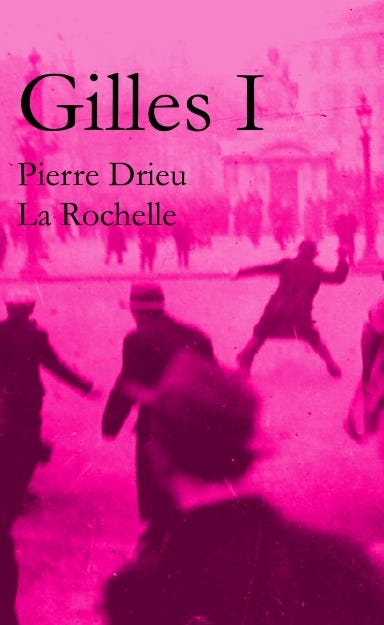Pierre Drieu La Rochelle was the author of more than a dozen novels and numerous essays and poetry collections. A relentless critic of the French Third Republic, he drifted in every political and artistic current of his time, refusing to ever be tied down to any single movement or ideology. As a surrealist, he traveled in the same circles as Louis Aragon, Gaston Bergery, and André Breton, but eventually fell out with the group over a love dispute. As a Socialist, he flirted with pacifism and pan-europeanism, however he found the Socialism of Paris entirely too Bourgeoisie. As a collaborator during the German occupation of France, he petitioned for the release of Jean-Paul Sartre (among other intellectuals) from prison, and helped Jean Paulhan escape capture by the Nazis. At the end of the war, hiding at the house of his friend André Malraux, he committed suicide by swallowing poison.
Best known in the English speaking world for his book Le Feu Follet, which was adopted into an acclaimed French nouvelle-vague film, Pierre Drieu La Rochelle considered the semi-autobiographical Gilles to be his greatest work. The acclaimed literary critic Gaëtan Picon wrote that Gilles “is, without any doubt, one of the greatest novels of the century—and one of those books in which the disarming sincerity of a man rises to the grandeur usually reserved to literary transpositions.”
The novel begins during the First World War, where the hero Gilles returns from the front after being badly wounded, his regiment having been decimated. Penniless, he asks his friends, the wealthy Falkenberg brothers, for help, only to discover that both of them had died. Their sister, Myriam, falls in love with him and helps him financially; although he does not respond to her love, Gilles accepts her support. He even decides to marry her when her father's death makes her a wealthy heiress. The day after the wedding, he leaves her, joins the army again and has a love affair with a nurse, whom he in turn leaves.
After the war, Gilles uses his ex-wifes money to become a feature of Parisian high society. More or less unwillingly, he is drawn into a plot against the President of the Republic, Morel, after befriending his son-in-law, Gilbert de Clérences, and meeting Caël, the leader and almost guru of a dandy political group. The ridicule of intellectuals, the grotesquerie of events, the cowardice and demagoguery of politicians—compounded by the departure of Dora, an American girl he likes—leads him to leave France and seek refuge in Algeria. There he meets a simple, wholesome young girl, Pauline, with whom he experiences a true love affair for the first time. Gilles returns to Paris, however. Still disgusted with society and politics, he starts a newspaper and, after the veteran’s riot of February 1934, decided to join the only ideology capable of radically changing society and regenerating France: Fascism.
Grief-struck by the death of Pauline and the child she was expecting, Gilles chooses to be alone, and joins Franco's side in the Spanish Civil War.
Despite his immense standing in the French inter-war literary scene, and his close relations with many of the most prominent writers and intellectuals of his time, Pierre Drieu La Rochelle has, because of his politics, been largely ignored by the Anglo literary establishment. His masterpiece, Gilles, has gone untranslated for the last seventy years… until now.
This table of contents is intended to track the ongoing English translation of Gilles. A new chapter is released every week, and the first section of the book (La Permission) being free to the general public.
Gilles
Pierre Drieu La Rochelle
I - LA PERMISSION
Chapter I - In which Gilles returns from the front.
Chapter II - In which Gilles meets Myriam.
Chapter III - The first stirrings of love.
Chapter IV - Recovery.
Chapter V - In which Gilles meets Mr Falkenberg.
Chapter VI - “He’s not a serious man.”
Chapter VII - In which Gilles travels to Trianon with Mabel
Chapter VIII - In which Gilles gets a job.
Chapter IX - “Are you going to marry this boy?”
Chapter X - Debrye.
Chapter XI - The tremor.
Chapter XII - In which Gilles visits Carentan.
Chapter XIII - Avenue de Messine
Chapter XIV - The suicide.
Chapter XV - Evening at Mrs Florimond’s.
Chapter XVI - The marriage.
Chapter XVII - The Consummation
Chapter XVIII- “I can’t do it.”
Chapter XIX- Alice
Chapter XX- Myriam
Chapter XXI- The End
Chapter XXII- Pantruche
II - L'ÉLYSÉE
III - L'APOCALYPSE
ÉPILOGUE
Pierre Drieu la Rochelle’s Gilles, described by Gaëtan Picon as “one of the greatest novels of the century,” will be released chapter by chapter every week. Subscribe now to get notice of the next installment of this great novel…
Tikhanov Library is an independent publishing company founded in Lund, British Columbia. To read Gilles and many other books, both reprints and new releases, visit our website at www.tikhanovlibrary.com | Our catalogue includes books by Alexis de Tocqueville, Dimitri Alioshin, and F.T. Marinetti, among other authors. We are constantly updating with new books and deals.






